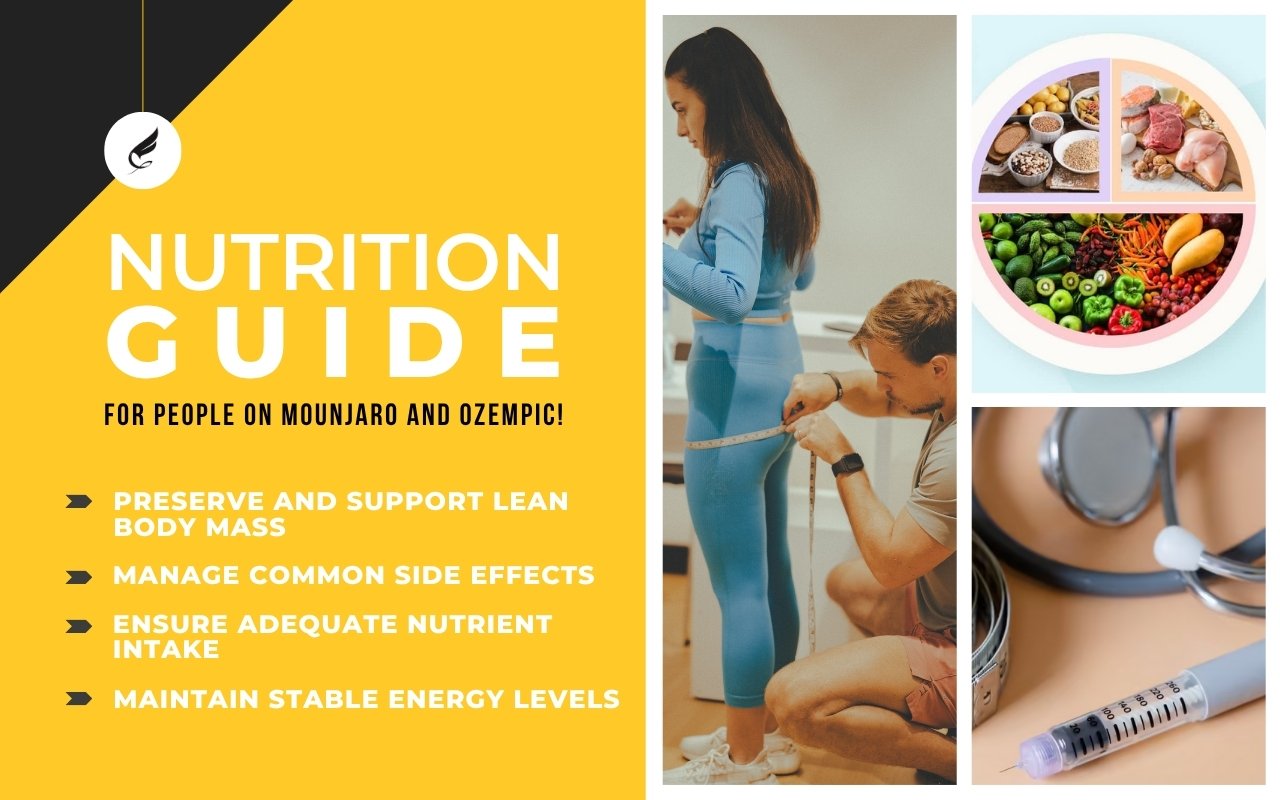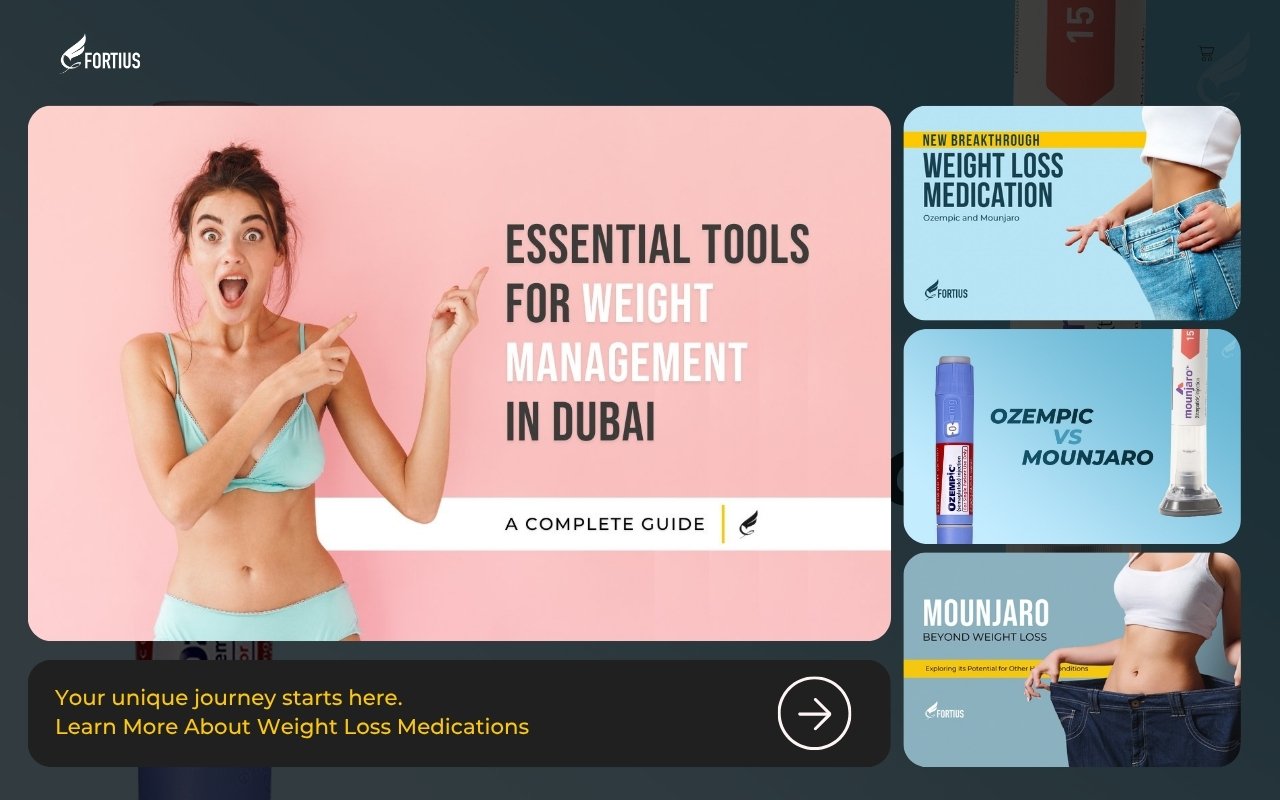Nutrition for GLP-1 Users: What to Eat in Dubai to Support Muscle and Manage Side Effects
A Personal Message from Milos Tanasic, Founder & Head Coach of Fortius Dubai
In our last discussion, we established that strength training is the non-negotiable antidote to the muscle loss associated with GLP-1 medications. Now, we must address its equally important partner: nutrition. This is the cornerstone of any effective weight management plan.
The powerful appetite suppression from these weight loss drugs is a game-changer for many on their weight loss journey. But it also presents a new, significant challenge: With a reduced desire to eat, how do you ensure adequate nutrient intake? How do you consume the vital nutrients necessary to preserve muscle mass, maintain energy levels, and feel your best?
"Just eating less" through forced caloric restriction is not a strategy; it's a liability. Your body is undergoing a rapid transformation, and it requires the right building blocks. This guide is my practical, coach-led approach to nutrition for GLP-1 users in Dubai. It’s designed to shift your focus from simply lowering your average calorie intake to making smart food choices that optimize health outcomes.
The New Nutritional Landscape: Why Every Calorie Counts
When your overall food intake drops, the nutritional quality of every single meal becomes magnified. You have a smaller window to give your body everything it needs to thrive. The primary goals of your nutrition therapy plan while on glucagon like peptide-1 (GLP-1) medications should be:
Preserve and Support Lean Body Mass: To prevent becoming "skinny fat" and maintain a healthy metabolism.
Manage Common Side Effects: Such as nausea, constipation, and fatigue.
Ensure Adequate Nutrient Intake: To avoid nutrient deficiencies, especially micronutrient deficiency.
Maintain Stable Energy Levels: To power you through your workouts and your busy Dubai life.
Pillar 1: Prioritizing Protein to Protect Your Muscle
This is your number one nutritional priority. Full stop. Protein intake provides the amino acids your body needs to repair and maintain muscle tissue, especially when your energy intake is low.
The "Protein-First" Eating Strategy: I instruct all my clients to eat the lean protein source on their plate first. With a reduced appetite, this ensures you consume the most critical component of your meal before you feel full, preventing an inadequate nutrient intake of protein.
Know Your Target: While the average person's average protein intake is often low, you must be strategic. Aim for 1.6 to 2.2 grams of protein per kilogram of your target body weight daily. This is key to preserving your lean body mass.
Choose High-Quality, Easy-to-Digest Protein Sources:
Lean protein from poultry (grilled chicken breast) and fish (grilled salmon, cod).
Eggs
Greek Yogurt and Cottage Cheese
High-Quality Whey or Casein Protein Shakes (an incredibly efficient way to ensure adequate protein).
In Dubai, options like grilled halloumi, lean shish tawook, and lentils (daal) are also excellent choices.
Pillar 2: Managing Common Side Effects Through Smart Food Choices
How you eat can make a world of difference in managing the most common side effects. Your dietary habits are a powerful tool.
For Nausea: This is often triggered by high fat foods, greasy, or overly sugary meals.
Solution: Eat smaller, more frequent meals. Opt for blander foods like crackers, toast, or rice. Avoid anything high in saturated fat. Ginger tea can also be very soothing.
For Constipation & Slowed Digestion: These drugs slow down gastric emptying.
Solution: Increase your fiber intake from dietary fiber sources and, crucially, water. Focus on your fruit and vegetable intake, and add small portions of whole grains.
For Fatigue & Energy Dips: Your body still needs fuel.
Solution: A healthy carbohydrate intake is essential. Incorporate nutrient-dense, complex carbohydrates in moderate portions, particularly around your training times, to support glycemic control and provide sustained energy.
Pillar 3: Hydration and Electrolytes – A Dubai Non-Negotiable
Dehydration is a significant risk. In the Dubai heat, this risk is amplified.
The Strategy:
Sip on water consistently. Carry a water bottle everywhere.
Incorporate sugar-free electrolyte powders into your water, especially around exercise, to replenish key nutrients lost through sweat.
Eat water-rich foods like cucumber and celery.
A Note on Nutritional Science & Professional Guidance
While this advice is a strong starting point, it's important to understand that achieving optimal health outcomes often requires a more structured approach. In our clinical practice, we look at established frameworks.
Dietary Guidelines: We align our recommendations with established dietary guidelines for healthy eating.
Personalized Targets: While there are general recommendations like the Dietary Reference Intake (DRI) for vital nutrients, your personal needs for adequate calories and macronutrients might differ. A professional can help you establish an Acceptable Macronutrient Distribution Range (AMDR)—the right balance of protein, carbs, and fats for you.
Preventing Deficiencies: A lower calorie intake increases the risk of micronutrient deficiency. For instance, ensuring adequate Vitamin D is crucial. Personalized dietary guidance helps prevent this.
Why Personalized Nutrition Coaching is a Game-Changer
This is where generic plans fall short and patient-centered nutritional guidance excels. Working with an expert coach at Fortius Dubai allows us to:
Create a Tailored Plan: We design a nutrition therapy plan that respects your food preference, lifestyle, and even helps you navigate challenges like emotional eating.
Provide Accountability: We help you implement the necessary lifestyle modifications to build sustainable healthy eating habits.
Troubleshoot in Real-Time: We help you adjust your dietary intake based on how your body responds, ensuring your nutritional status supports your goals. This level of personalization is often why our clients see better long-term health outcomes than those from methods like bariatric surgery alone, as they build lifelong skills.
Calculate Your Personal Nutrition Targets
Theory is one thing, but application is everything. To achieve your fat loss goals and preserve lean muscle tissue, you need to know your numbers. Use our FREE, comprehensive calculator to determine your ideal daily calorie and macronutrient targets in under 60 seconds.
Conclusion: Fueling the Transformation, Not Just the Weight Loss
Nutrition for GLP-1 users is a strategic tool to build a better body, not just a smaller one. The goal is to use glucagon like peptide-1 receptor agonists as part of a holistic plan that improves your overall health, cardiovascular health, and body composition. While more future large scale studies will continue to provide insights, the principles of prioritizing lean protein, fiber, and essential micronutrients within a balanced diet are sound. By shifting your focus from simple caloric restriction to smart, nutrient-dense eating, you take control of your transformation and pave the way for sustainable success.
Are you navigating your weight loss journey on Ozempic or Mounjaro in Dubai and want to ensure you're getting the right dietary guidance? Don't leave your health and muscle mass to chance. Book a complimentary consultation with the expert nutrition coaches and trainers at Fortius Dubai. Let's create a personalized plan to fuel your body correctly and achieve optimal health outcomes.
FAQ (Frequently Asked Questions)
-
While no foods are strictly "forbidden," most people feel better when they avoid high fat foods, greasy, fried, and very sugary items. These can exacerbate side effects like nausea due to slowed digestion.
-
This is a common challenge. Liquid nutrition is your friend. High-quality protein shakes are an efficient way to get adequate protein. Also, focus on smaller, protein-dense snacks like Greek yogurt or a hard-boiled egg instead of trying to eat large meals.
-
The key is focusing on nutrient-dense foods. This means choosing foods that pack the most vitamins and minerals per calorie. Think leafy greens, colorful vegetables, lean protein, and whole grains. A high-quality multivitamin and Vitamin D supplement may also be beneficial, but you should discuss this with your healthcare provider.
-
The principles of prioritizing protein, eating whole foods, and managing portion sizes are the foundations of any healthy, sustainable lifestyle. While your appetite will return and your calorie intake will need to be adjusted upwards for maintenance, the healthy eating habits you build now are the exact ones that will help you maintain your results for life.







